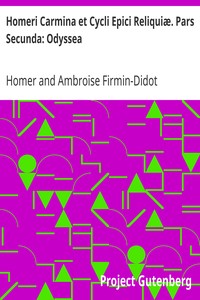Homeri Carmina et Cycli Epici Reliquiæ. Pars Secunda: Odyssea by Homer
"Homeri Carmina et Cycli Epici Reliquiæ. Pars Secunda: Odyssea" by Homer is a classical epic poem, likely written in ancient Greece during a time period spanning from the 8th to 6th century BC. This renowned work continues the saga of the protagonist Ulysses (Odysseus), chronicling his adventures as he struggles to return home after the Trojan War, amidst numerous trials and divine interventions. The narrative is rich with themes of heroism, loyalty,
and the personal growth of its characters, notably focusing on Ulysses and his son Telemachus. The opening of the poem introduces the dramatic thrust of the narrative, beginning with the gods convening to discuss the fate of Ulysses, who has been trapped on the nymph Calypso's island for seven long years. Pallas Athena, compassionate toward Ulysses, decides to intervene to help him return home, appearing to Telemachus in disguise and urging him to seek news of his father. Meanwhile, the suitors of Penelope, Ulysses' wife, misbehave in Ulysses' palace, causing distress for Telemachus, who longs for his father's strength and presence. As the story unfolds, Telemachus is inspired to embark on a journey in search of Ulysses, setting the stage for the ensuing adventures in the epic. (This is an automatically generated summary.)
Read or download for free
| How to read | Url | Size | |||
|---|---|---|---|---|---|
| Read now! | https://www.gutenberg.org/ebooks/52693.html.images | 1.0 MB | |||
| EPUB3 (E-readers incl. Send-to-Kindle) | https://www.gutenberg.org/ebooks/52693.epub3.images | 403 kB | |||
| EPUB (older E-readers) | https://www.gutenberg.org/ebooks/52693.epub.images | 414 kB | |||
| EPUB (no images, older E-readers) | https://www.gutenberg.org/ebooks/52693.epub.noimages | 370 kB | |||
| Kindle | https://www.gutenberg.org/ebooks/52693.kf8.images | 947 kB | |||
| older Kindles | https://www.gutenberg.org/ebooks/52693.kindle.images | 1.1 MB | |||
| Plain Text UTF-8 | https://www.gutenberg.org/ebooks/52693.txt.utf-8 | 729 kB | |||
| Download HTML (zip) | https://www.gutenberg.org/cache/epub/52693/pg52693-h.zip | 393 kB | |||
| There may be more files related to this item. | |||||
Similar Books
About this eBook
| Author | Homer, 751? BCE-651? BCE |
|---|---|
| Editor | Firmin-Didot, Ambroise, 1790-1876 |
| Title | Homeri Carmina et Cycli Epici Reliquiæ. Pars Secunda: Odyssea |
| Note | Reading ease score: 30.9 (College-level). Difficult to read. |
| Note | Wikipedia page about this book: https://en.wikipedia.org/wiki/Odyssey |
| Credits | Produced by Carolus Raeticus |
| Language | Latin |
| LoC Class | PA: Language and Literatures: Classical Languages and Literature |
| Subject | Odysseus, King of Ithaca (Mythological character) -- Poetry |
| Subject | Epic poetry, Greek -- Translations into Latin |
| Category | Text |
| EBook-No. | 52693 |
| Release Date | Aug 1, 2016 |
| Copyright Status | Public domain in the USA. |
| Downloads | 328 downloads in the last 30 days. |
| Project Gutenberg eBooks are always free! | |


